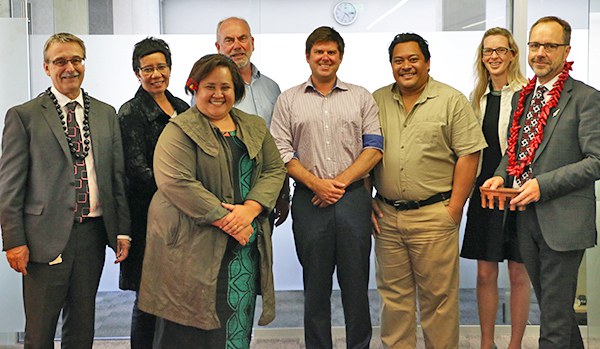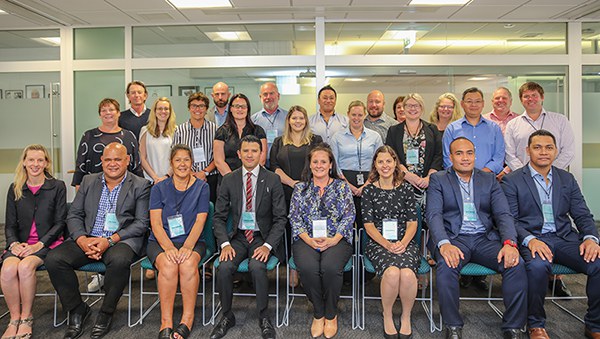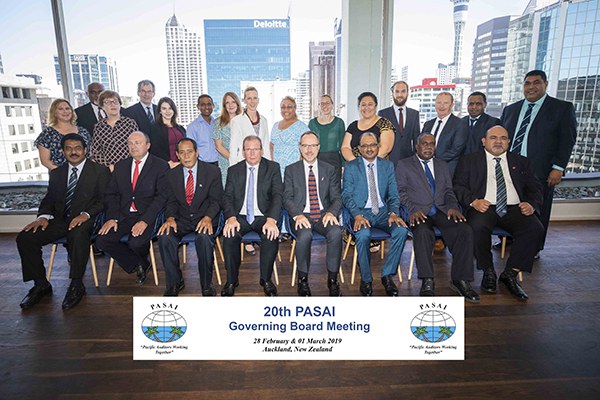A shared purpose: Connecting with our Pacific colleagues
The challenges our public institutions and organisations face and the techniques they use to address them are changing all the time. Exchanging knowledge with staff from other nations’ Supreme Audit Institutions (SAIs) is how we develop, test, and further explore what we mean when we talk about integrity and accountability. Our staff are regularly invited to participate in training events with our international counterparts and asked to contribute to knowledge-sharing exercises to strengthen public sector auditing around the world.
February has been a month of significant international activities. We’ve hosted seconded auditors from Samoa, undergone a rigorous world-class integrity assessment, and contributed to the 20th Pacific Association of Supreme Audit Institutions (PASAI) Governing Board meeting.
Samoa-New Zealand twinning activities

New Zealand has “twinning” relationships with Samoa and the Cook Islands Audit Offices. We recently had the honour of having colleagues from the Samoan Office of the Auditor-General as secondees to observe our staff in action, and share information, processes, and knowledge.
The February visit was the third and final in a series of visits by senior staff from the Samoan Audit Office since November 2018. The two-week visits saw the secondees paired with sector managers from our Parliamentary Group, and our Legal and Inquiries team to experience first-hand the work we do and how we do it. The visits were also timed to coincide with Parliament’s annual review season. This provided an opportunity for our visitors to observe how our Office interacts with select committees to ensure that the performance of our public entities is properly scrutinised.
IntoSAINT

IntoSAINT – short for the International Organisation of Supreme Audit Institution’s Self-Assessment of Integrity – was developed by the Netherlands Court of Audit and launched in 2010. It’s a self-assessment tool that enables SAIs to evaluate the quality and maturity of their integrity systems.
Over the last nine years, many SAIs worldwide have carried out IntoSAINT workshops training staff to deliver the self-assessment tool both within their country, and to assist other SAIs to carry out the assessment process. The IntoSAINT tool can also be applied to any public sector organisation and has been powerfully used, particularly in Latin America, to raise awareness of the importance of integrity in all parts of the public sector.
Now managed and run by Mexico’s SAI, facilitator Francisco Parral-Pineda ran an intensive week of training and assessment with a dual purpose: first, training auditors from across the Pacific region to do these workshops themselves, then testing the self-assessment process on our Office.
As a self-assessment tool, it raised some hard questions, prompted spirited discussions, and identified some challenging situations. All of this was ably captured by the moderators and reported back to our senior management team.
The nature of improvement is to challenge existing thinking – and changing things for the better means honestly looking at what’s not working, while highlighting and building upon strengths. The IntoSAINT process provides a robust way to do this.
Between now and 30 June 2019, the newly trained facilitators will apply the tool in the Australian National Audit Office, the Cook Islands Audit Office, the Samoan Audit Office, and one public sector organisation in Samoa and the Cook Islands. This will complete the pilot programme and enable an informed decision to be made about taking the tool out further to other SAIs in the Pacific region. The current pilot programme has been made possible through funding provided by the Ministry of Foreign Affairs and Trade (MFAT) to our Office to support PASAI and its work to improve governance and accountability in the Pacific.
20th meeting of the governing board

PASAI held its 20th Governing Board Meeting in Auckland from 28 February to 1 March 2019.
The meeting was chaired by the Auditor-General of Australia, Grant Hehir, who is currently the Chair of PASAI, and attended by the Auditors-General of Fiji, Tuvalu, New Caledonia, Samoa, Solomon Islands, and Tonga, with support from New Zealand who hold the role of Secretary-General of PASAI.
The meeting was also attended by development and funding partners representing MFAT, the Australian Department of Foreign Affairs and Trade, The European Union Delegation to Fiji, the United Nations Development Programme, and the World Bank. These partners and their funding support are critical to PASAI and its ability to run a programme to support the work of auditors across the Pacific.
The meeting focused on the response to the recent independent review of PASAI’s performance over the last five years and how the findings of the review will influence the focus and delivery approach for its next five years. The overall success of the work of PASAI to date was confirmed along with the validity of the strategic priority areas as set out in its 2014-24 Strategy. Discussion focused on public financial management issues, accountability and transparency goals, and how PASAI can support its members to improve these across our region.
More to come
As well as building on the work of the past month, our Office is looking ahead to other opportunities to learn from our international counterparts. We’re currently preparing papers and getting ready for two important international meetings of Auditors-General later this year: the Global Audit Leaders Forum in China, and the International Organization of Supreme Audit Institutions’ three-yearly congress in Russia. Keep an eye on our social media channels to learn more about our contributions to these events.
